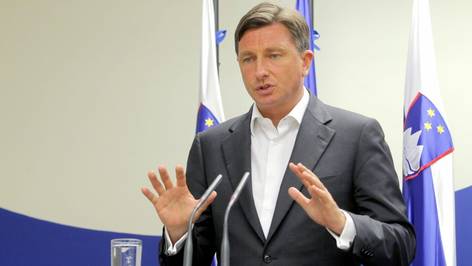NEWS
Prime Minister Borut Pahor attends a press conference following a coalition partner meeting
At the press conference following today's coalition partner meeting, Slovenia's Prime Minister, Borut Pahor, announced that the Minister of Education and Sport, Dr Igor Lukšič, is to temporarily take over the management of the Ministry of Higher Education, Science and Technology, and said that he had already notified the National Assembly of his decision, which is expected to discuss it this Wednesday. According to Prime Minister Pahor, Mr Lukšič will take over the temporary management of the said ministry immediately afterwards. At the same time, Mr Pahor explained that Mr Lukšič would be at the head of the ministry until the appointment of a new minister or the eventual cabinet reshuffle, which could include the merging of some ministries. Prime Minister Pahor said that he had met with Jozsef Györkös, State Secretary at the Ministry of Higher Education, Science and Technology, and had asked him to consider remaining in his position.
Prime Minister Pahor added that 'after today's discussion with both coalition party leaders, it is now possible to predict with certainty that the Zares Party will leave the coalition'. As a result, Mr Pahor announced that he planned to meet with the LDS chairwoman early next week to discuss the Government's operation until the vote of confidence and the appointment of temporary substitute ministers for the outgoing Zares ministers. 'I am very determined to do everything I can to bring Slovenia through the crisis before the end of my term,' stressed the Prime Minister by adding that he would also strive to prevent the LDS party from leaving the coalition. In this respect, he expressed his opinion that he could lead a minority government until the end of his term if an agreement could be reached between the social partners and parties with a similar political platform to support the key projects such as health and labour market reforms. As regards making the vote of confidence conditional upon the adoption of a supplementary budget, Mr Pahor said that he still allowed this possibility in order to "clarify the issue of an alternative solution". In his personal opinion, the most responsible solution would be a constructive vote of no confidence. 'If anyone wishes to avoid a political crisis, he should propose a new prime minister; otherwise, let me finish my term at the head of a minority government,' he stressed and added that today's discussions had shown that the growing political uncertainty was not down to public distrust but rather due to the differences between the political parties. 'This is a very welcome result that finally puts forward an alternative solution to this Government," concluded Mr Pahor.




